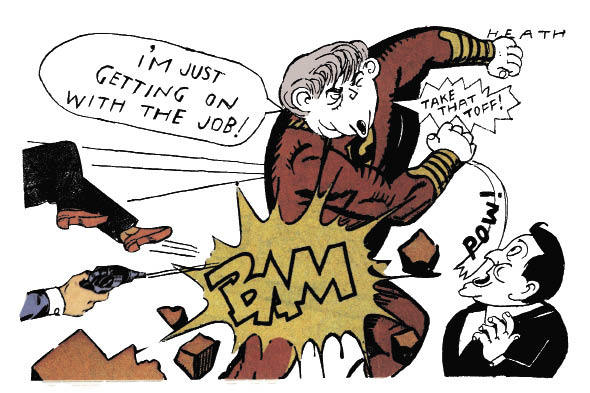A failed attempt by Mr Geoff Hoon and Miss Patricia Hewitt to provoke a ballot on the Labour leadership was not mentioned at the next meeting of the Cabinet meeting, Mr Gordon Brown, the Prime Minister said. Instead he had urged ministers to apply a ‘laser focus’ on Britain’s problems, such as the weather. A week earlier, Mr Brown had said that Labour had a ‘laser focus on school standards’. He told the News of the World that he had been inspired, like Nelson Mandela, by W.E. Henley’s poem ‘Invictus’ (though he did not mention that Timothy McVeigh, the Oklahoma bomber, had been inspired by it too). Mr Alan Johnson, the Home Secretary, made Islam4UK a proscribed group; it is also proscribed under the name Al Muhajiroun, Call to Submission, Islamic Path and London School of Sharia, as it had already been as Al Ghurabaa and The Saved Sect. Mr Peter Robinson stood aside as the First Minister of Northern Ireland for up to six weeks (under the Northern Ireland Act 1998). This followed the expulsion of his wife, Iris, from the Democratic Unionist Party after it was found she had secured £50,000 in 2008 from two developers to help a 19-year-old man, with whom she was having an affair. Jessica Davies, the niece of Mr Quentin Davies, a junior defence minister, was jailed for 15 years for murdering a man in Paris. Miss Harriet Harman, the Leader of the House of Commons, was fined £350 for driving without due care and attention while on her mobile phone. Virgin Money bought a small private bank, Church House Trust. Mr Jonathan Ross, a television presenter, said he would end his contract with the BBC in July. Mr Chris Evans took over the early-morning Radio 2 programme on the retirement of Sir Terry Wogan.
Britain attempted to return to business after a week or more engaged with snowy weather. The lowest temperature recorded was at Altnaharra in Wester Ross, with minus 22.3˚C. Many schools closed. Lord Adonis, the Transport Minister, made local authorities agree to use 25 per cent less salt to save supplies, and then even less. More than 14,000 trains were cancelled in a week. People were told only to travel if necessary, and many stayed home from work. But the Ripon Hornblower, Mr George Pickles, blew the town’s horn at 9 p.m. each night, as it has been blown since ad 884, though temperatures fell to minus 10˚C: ‘I thought my lips were going to freeze to the horn,’ he said. An extra 322,731 potholes were said to have appeared in roads. Fifteen thousand people in Warrington lost piped water. Twenty people queued all night in a temperature of minus 8˚C to secure beach huts for next summer at Christchurch, Dorset. A flock of swans frozen into a lake at Wallasey, Merseyside, were freed with a mechanical digger.
An earthquake killed thousands in Haiti. Many remained trapped in the rubble in Port-au-Prince, near the epicentre. Several strong aftershocks followed and the headquarters of the UN peacekeeping force was destroyed. General David Petraeus, the United States commander for the Middle East, on being asked on television about the vulnerability of Iran’s nuclear installations, said: ‘Well, they certainly can be bombed. The level of effect would vary with who it is that carries it out.’ Iran called his comments ‘thoughtless’. Israel is to build a barrier along its border with Egypt on the edge of the Gaza Strip and near Eilat on the Red Sea. A video was shown on al-Jazeera television of Humam Khalil Abu-Mulal al-Balawi, a Jordanian, promising vengeance on America; he blew up seven CIA officers and a Jordanian intelligence officer in a suicide attack on 30 December at Forward Operating Base Chapman, in Afghanistan. The Jordanian tribe of Al Nawaysa resolved to name all sons born in 2010 Saddam when the government persuaded the mayor of Mazar not to name a street after Saddam Hussein.
China said its exports had exceeded Germany’s in 2009, making it the world’s biggest exporter. Blizzards destroyed 800 houses in the Xinjiang region of China and 5,000 people were evacuated. Google said it was unwilling to continue censoring content in China. Thirty people in Hong Kong were injured in one night by an unknown acid attacker, who has injured more than 100 in 13 months. Gunmen opened fire on the coach carrying the Togolese football team to the Africa Cup of Nations, killing three at the border of Congo and the Angolan enclave of Cabinda. The team was instructed by the government of Togo to return home. The Nigerian parliament voted to send a delegation to Saudi Arabia to check on President Umaru Yar’Adua’s health following a heart operation. An Indonesian ferry between Sulawesi and Borneo sank with the loss of all but 21 of the 267 aboard. The Malaysian high court overturned a government ban on non-Muslims using the word Allah to refer to God. CSH






Comments